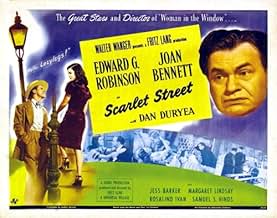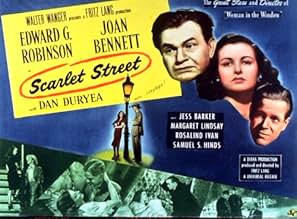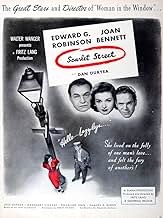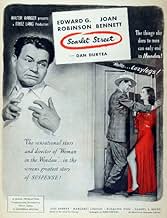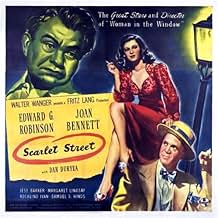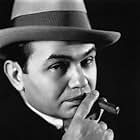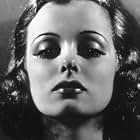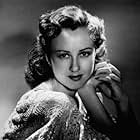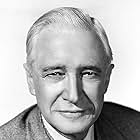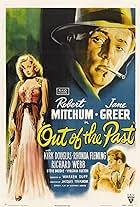A man in mid-life crisis befriends a young woman, though her fiancé persuades her to con him out of the fortune they mistakenly assume he possesses.A man in mid-life crisis befriends a young woman, though her fiancé persuades her to con him out of the fortune they mistakenly assume he possesses.A man in mid-life crisis befriends a young woman, though her fiancé persuades her to con him out of the fortune they mistakenly assume he possesses.
- Awards
- 3 nominations
Anita Sharp-Bolster
- Mrs. Michaels
- (as Anita Bolster)
Richard Abbott
- Critic at Gallery
- (uncredited)
John Barton
- Hurdy-Gurdy Man
- (uncredited)
Rodney Bell
- Barney
- (uncredited)
Ted Billings
- Vendor
- (uncredited)
Richard Cramer
- Principal Keeper
- (uncredited)
Dick Curtis
- Detective
- (uncredited)
- Director
- Writers
- All cast & crew
- Production, box office & more at IMDbPro
Storyline
Did you know
- TriviaTwelve paintings done for the film by John Decker were sent to the Museum of Modern Art in New York City for exhibition in March of 1946.
- GoofsThe story takes place in 1934, but all of Margaret Lindsay's and Joan Bennett's clothes, shoes, and hairstyles are strictly in the 1945 mode; fashions had changed considerably during the intervening eleven years. The featured taxicab is a late-1930s vintage, about three years too new.
- Quotes
Adele Cross: Next thing you'll be painting women without clothes.
Christopher Cross: I never saw a woman without any clothes.
Adele Cross: I should hope not!
- Alternate versionsAlso available in a computer colorized version.
- ConnectionsEdited into This Is It (2009)
Featured review
Scarlet Street (1945)
It starts slowly, with little bits of intrigue and a lot of empathy for Edward G. Robinson's character, Chris Cross, a lonely cashier with dreams of being in love. And then he sees a man hitting a young woman on the street, and he rushes to help her. Things start a torturous, complicated, fabulous decline from there. The woman sees how Cross finds her beautiful, but Cross, it turns out, is unhappily married. And petty, selfish cruelty turns to many worse things.
Fritz Lang, the Austrian director now firmly settled into Hollywood, is not known for cheerful movies (he directed M, for one), and this one draws on so much empathy, and heartbreak, and finally downright shock and surprise, it's breathtaking. Great film-making, beautiful and relentless. The woman, Joan Bennett, comes alive on the screen, duplicitous and raw. Her boyfriend, Dan Duryea, is perfect Duryea, clever and annoying and as usual, coming out less than rosy.
The cinematographer, Milton Krasner, has so many richly brooding and dramatic films to his credit, it's almost a given that we will be invisibly swept into every scene (and much of the action takes place in an apartment almost tailor made for great filming, with glass doors, and two levels to look up or down from). The story is key, based on a novel by Georges de La Fouchardière, little known here, but he wrote "La Chienne," the basis for Jean Renoir's second film (1931), where the film announces to the audience that it is about, "He, she, and the other guy . . . as usual." And that describes Scarlet Street just as well, for starters.
Lang is credited as one of the key shapers of the film noir style, and that certainly applies visually. It lacks that film noir key of a young man at odds with post-War America, but it does have a man, alone, at odds with the world. Chris Cross is a pathetic creature, far more naive than most of us could ever be, but yet we identify with him because he represents innocence swept up in a world more sinister than we expect. He's a victim, in a way, but also the cause of his own troubles.
And troubles they are. What a story, what a film. Dark, wrenching, and unpredictable. Very Fritz Lang.
It starts slowly, with little bits of intrigue and a lot of empathy for Edward G. Robinson's character, Chris Cross, a lonely cashier with dreams of being in love. And then he sees a man hitting a young woman on the street, and he rushes to help her. Things start a torturous, complicated, fabulous decline from there. The woman sees how Cross finds her beautiful, but Cross, it turns out, is unhappily married. And petty, selfish cruelty turns to many worse things.
Fritz Lang, the Austrian director now firmly settled into Hollywood, is not known for cheerful movies (he directed M, for one), and this one draws on so much empathy, and heartbreak, and finally downright shock and surprise, it's breathtaking. Great film-making, beautiful and relentless. The woman, Joan Bennett, comes alive on the screen, duplicitous and raw. Her boyfriend, Dan Duryea, is perfect Duryea, clever and annoying and as usual, coming out less than rosy.
The cinematographer, Milton Krasner, has so many richly brooding and dramatic films to his credit, it's almost a given that we will be invisibly swept into every scene (and much of the action takes place in an apartment almost tailor made for great filming, with glass doors, and two levels to look up or down from). The story is key, based on a novel by Georges de La Fouchardière, little known here, but he wrote "La Chienne," the basis for Jean Renoir's second film (1931), where the film announces to the audience that it is about, "He, she, and the other guy . . . as usual." And that describes Scarlet Street just as well, for starters.
Lang is credited as one of the key shapers of the film noir style, and that certainly applies visually. It lacks that film noir key of a young man at odds with post-War America, but it does have a man, alone, at odds with the world. Chris Cross is a pathetic creature, far more naive than most of us could ever be, but yet we identify with him because he represents innocence swept up in a world more sinister than we expect. He's a victim, in a way, but also the cause of his own troubles.
And troubles they are. What a story, what a film. Dark, wrenching, and unpredictable. Very Fritz Lang.
- secondtake
- May 4, 2010
- Permalink
Details
Box office
- Budget
- $1,202,007 (estimated)
- Runtime1 hour 42 minutes
- Color
- Aspect ratio
- 1.37 : 1
Contribute to this page
Suggest an edit or add missing content



